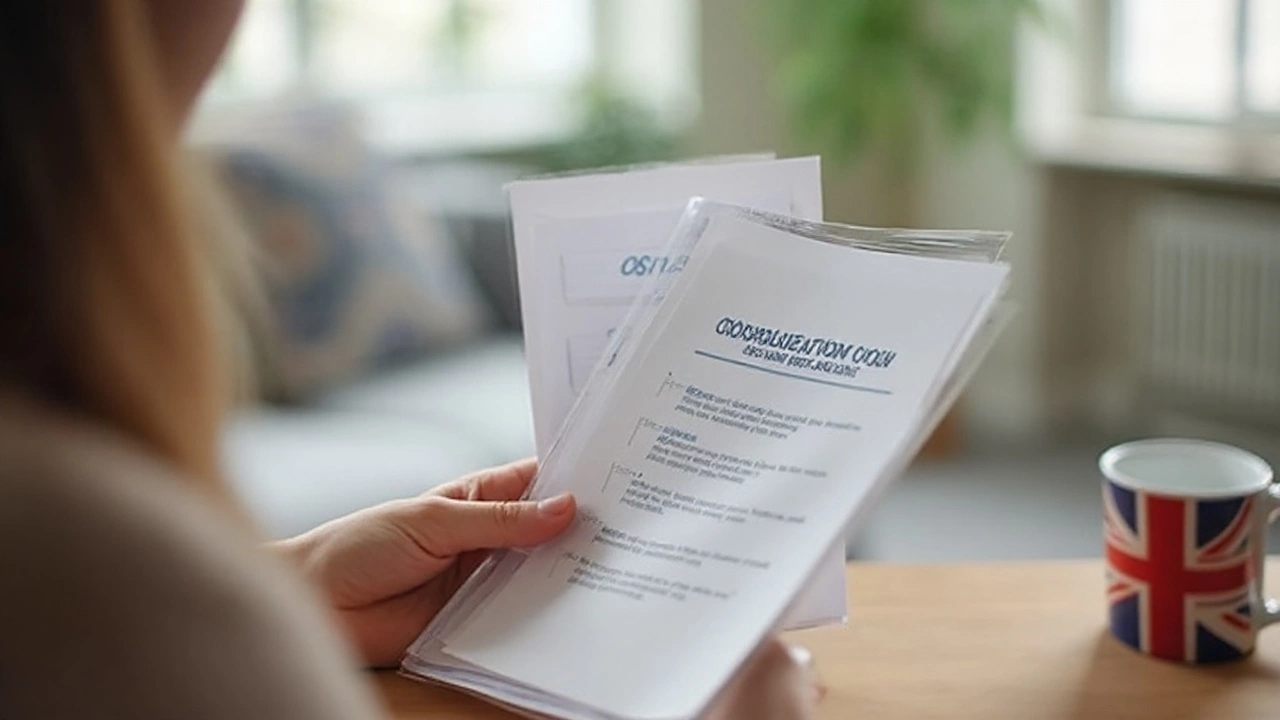Do Consolidation Loans Affect Your Credit Score? The Real Impact Explained
 Aug, 5 2025
Aug, 5 2025
No one likes to see their credit score take a dive, right? But debt can pile up, and suddenly, those monthly bills feel like waves crashing all at once. It’s tempting to look for a lifeline, and consolidation loans often seem like the rescue raft. Yet, there’s this nagging voice: Will taking out a consolidation loan mess up my credit score?
How Consolidation Loans Actually Work
Before we get too far, let’s break down what a consolidation loan really is. Instead of juggling five different minimum payments at crazy-interest rates, you take one loan to pay off everything at once. Now you just owe the new lender—ideally at a lower interest rate—one simple monthly amount. It sounds like common sense, and sometimes, it seriously makes life easier.
But not all consolidation loans are created equal. Some are personal loans from a bank, others come through online lenders. There are even options like home equity lines of credit, but that’s a bigger, riskier move since your home is on the line. Here in Toronto, you’ll find both big banks and peer-to-peer lenders pushing these products. According to the Financial Consumer Agency of Canada, personal loans made up 22% of all non-mortgage borrowing in 2024, so you’re in good company if you’re considering this route.
When you apply, lenders check your credit. They’re looking for borrowers who are less likely to default, so if your credit’s in rough shape, you might have to hunt harder for approval or pay a higher rate. Applying for a consolidation loan itself triggers what’s called a “hard inquiry” on your credit report. One inquiry? Usually, not a big deal. Five or six in a month? Credit agencies start wondering if you’re getting desperate for cash, so be strategic when shopping for quotes. Focus your applications within a couple of weeks. TransUnion, one of Canada’s big credit reporting agencies, usually counts multiple inquiries as just one if they’re grouped like this.
Bottom line: a consolidation loan lets you combine debts, lowers your stress, and gives you a fighting chance at financial breathing room. But it’s not a magic fix, and there are real risks for your credit score if you don’t manage things properly.
Does a Consolidation Loan Hurt or Help Your Credit Score?
This is where it gets tricky. People hear stories both ways: some say consolidation saved their credit, others swear it wrecked things. So, what’s the truth?
First, yes—your score may dip a little after you apply, thanks to those hard credit checks we talked about. But this is usually short-lived. If you’re disciplined and keep up with your new payments, that bump can reverse and your score can climb higher than before. Clearing out all those old balances helps your “credit utilization ratio” (how much debt you owe compared to your limits), and that score factor makes up about 30% of your FICO score. The lower your utilization, the better for your credit.
So, if you had three credit cards, each close to maxed out, and a personal loan, your utilization was sky-high. Once you consolidate and pay those cards off, your utilization plunges overnight. That’s one way a consolidation loan can boost your credit, not trash it.
Of course, it’s not guaranteed. If you start racking up new balances on those same cards—treating them like a “blank slate” now that they’re cleared—debt will balloon again and tank your score even further. This trap messes up a lot of people. One Bank of Montreal study last winter found that nearly 45% of Canadians who took out a debt consolidation loan ran up their old cards within the first year. With discipline, though, the payoff can be big: Equifax Canada reports that people who stick to consolidation loans and stop increasing their total debt see average score jumps of 50+ points within six months.
Here’s a simple table that shows how factors involved in consolidation loans can boost or hurt your credit score:
| Action/Impact | Effect on Credit Score |
|---|---|
| Hard Inquiry | Temporary dip (5–15 points) |
| Paying off credit cards | Credit utilization drops, score improves |
| New loan account added | Minor dip from reduced average account age |
| Missing a payment on new loan | Significant negative impact |
| Increasing old card balances post-loan | Score drops again |
Bankrate’s recent summary says,
“Used responsibly, debt consolidation loans can actually set the groundwork for higher credit scores down the road.”Used irresponsibly? Well, things get messy.

Key Risks: When Consolidation Loans Go Wrong
Here’s where reality bites. The promise of lower payments and faster debt relief is tempting, but if you make a misstep, it can spiral.
One big risk? Late or missed payments. Lenders report every payment to the credit bureaus, and a single missed payment on a consolidation loan can drop your score 50–100 points. That’s the difference between being “good” and suddenly on “high risk” lists. Automation is your friend here—set up direct debits as soon as the loan is set up. If you do hit a rough month and can’t make the payment, call your lender immediately. They’re usually more willing to work out a payment plan than people expect, especially if you take the initiative.
There’s also what I call the “double trouble effect.” This happens if you pay off your cards with the loan, then start using your credit cards all over again. It’s easy to justify: “I can handle it this time.” But pretty soon, you’re sitting on a bigger pile of total debt. FICO’s research from 2023 showed credit scores for folks who used a consolidation loan and then ran up new card debt often ended up worse than when they started.
Another issue is “account age.” Credit history length also counts towards your score, around 15%. Opening a brand-new loan lowers your average age of credit. It’s not a huge effect—usually a few points shaved off—but it’s something to be aware of, especially if you’ve just opened other new accounts recently.
If you close old credit cards after paying them off, your available credit drops, causing your utilization ratio to rise again (as strange as that sounds). Pros recommend keeping old cards open but tucked away, maybe stored at your parents’ place or frozen in a block of ice—whatever keeps them out of your wallet!
Several lenders in Canada now offer “credit builder” plans, which are a type of loan designed just for boosting credit, but consolidation loans are for clearing actual debt. Don’t mix up the two—they serve different purposes and have different terms. Always read the fine print and know your exit plan before signing anything.
If you’re curious, here’s a statistic that may surprise you: the average Canadian carries about $21,183 in non-mortgage debt as of spring 2025. So, if you’re feeling overwhelmed, you’re definitely not alone.
Tips for Using a Consolidation Loan the Right Way
If a consolidation loan makes sense for you, some basic habits can keep you out of trouble and in your bank’s good books. Here’s what’s worked for people who’ve actually dug themselves out of debt:
- Budget like your life depends on it. Know exactly what you owe, when each payment is due, and how much wiggle room you have after necessities.
- Set up autopay. Never rely on memory. Automate your payments for the new loan so you don’t miss deadlines.
- Shred temptation. After paying off cards, stash them somewhere hard to reach. Some people even put them in a locked box with no easy access.
- Don’t close your old credit cards. Keep them open with zero balance—this keeps your credit utilization low.
- Track your progress. Check your score at least once a month. Score providers like Borrowell and Credit Karma are free and don’t affect your score when you check.
- Think of it as the last loan. The whole point is to end the debt cycle. If you see the new monthly payment as “extra space,” use that slack to increase your emergency savings, not your spending.
- Read before you sign. Some consolidation loans come with hidden fees or high interest rates if you’re not watching. Watch for early repayment penalties and ask the lender to confirm in writing that they will pay your creditors directly if that’s their policy.
It may sound strict, but these moves really do work. One friend here in Toronto wiped out $15,000 in card debt—then kept the cards unreadable by taping a reminder note right to the plastic: “Only use in actual emergencies!” That one, small act made a world of difference.

Frequently Asked Questions About Consolidation Loans and Credit
Even if you think you know everything now, there are always a few doubts.
- Q: Will my score drop when I apply for a consolidation loan?
A: Most people see a small, temporary drop (typically 5-15 points) due to the credit inquiry. If you don’t go overboard with applications, this usually bounces back fast. - Q: How long does it take to see improvement?
A: Responsibly managing the loan, paying on time, and not adding new debt can show score bumps within 3-6 months. - Q: Should I close accounts I’ve paid off?
A: Leave them open with zero balance. It helps your utilization ratio and signals responsible credit use. - Q: Can I use a home equity line of credit (HELOC) for consolidation?
A: Yes, but it’s riskier—defaulting could put your house at risk. This is better for people with stable income and large balances. - Q: Will a consolidation loan erase negative marks?
A: Nope. Late payments and defaults stay on your report. The loan won’t erase history, but it helps prevent future dings if you use it right.
If you’re thinking about a consolidation loan, don’t rush. Ask lenders plenty of questions about payoff terms, interest rates, and what happens if you hit a rough patch. The more info you have, the safer your score—and your sanity—will be.
